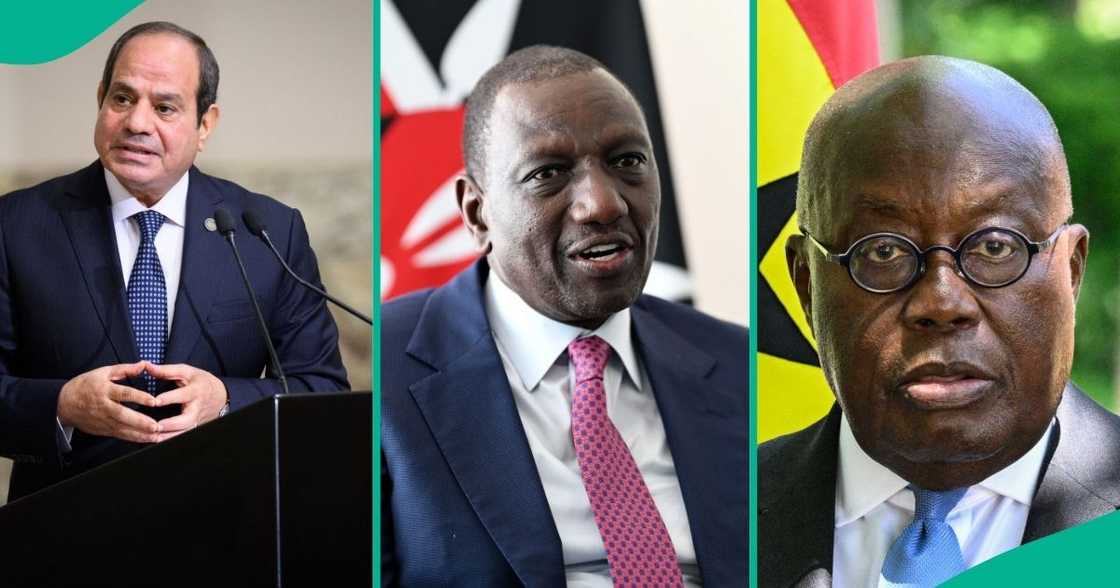IMF Releases List of Most Indebted Countries in Africa in 2024 as Nigeria Repays Some Loans
- Recent data from the International Monetary Fund show the most indebted Afriacn countries in 2024
- The list includes Egypt, which has the most debt to the IMF, standing at over $9 billion as of December 2024
- Analysts have disclosed that IMF loans come with stringent conditions, impacting citizens in several ways
Legit.ng’s Pascal Oparada has reported on tech, energy, stocks, investment and the economy for over a decade.
Some African countries continue to struggle with staggering debt levels owed to the International Monetary Fund (IMF), with 10 countries becoming the most indebted as of December 2024.
IMF loans come with harsh conditions that influence domestic economic policies.

Source: Getty Images
IMF imposes challenging conditions on loans
Measures such as subsidy removal, currency devaluation or adjustments, and austerity plans are often attached to IMF loans, sparking debates about their impact.
Analysts have argued that these adjustments and conditionalities restrict spending on critical sectors like healthcare, education, and infrastructure as citizens become worried about debt sustenance and economic resilience.
As these African countries battle to balance fiscal needs and development priorities, increasing IMF debt shows the complexities of dependency on external funding.
Africa’s most indebted countries to IMF
IMF lists Africa as one of the top 1 most indebted countries as of December 2024.
Egypt
Egypt ranks top on the list with an outstanding IMF credit of $9.45 billion. Its dependence on IMF funding highlights the difficulty of addressing fiscal and economic stability.
Kenya
East Africa’s most robust economy owes the IMF about $3.02 billion as it grapples with economic reforms to boost growth while managing debt obligations.
Angola
Angola, one of Africa’s oil-producing countries, owes the IMF $2.99 billion. The international lender must navigate the effects of volatile crude oil prices and diversify its economy.
Ghana
Ghana’s debt to the IMF was the focal point of its recently concluded elections, with the incoming President, John Mahama, promising to review the loans.
The West African country owes the IMF about $2.25 billion as it focuses on meeting its financial obligations while implementing policies to cushion its currency and improve economic resilience.
Ivory Coast
The country’s debt to the IMF stands at $2.19 billion. The country’s financial plans include using external funding to sustain its infrastructure and development projects.
DRC
The DRC’s debt to international lenders stands at $1.6 billion, and they are key to addressing the country's economic challenges.
Ethiopia
The East African country is indebted to the IMF for $1.31 billion as it navigates economic reforms and recovery efforts while addressing internal conflicts.
South Africa
The current biggest economy on the continent owes the IMF $1.14 billion as part of its efforts to recover from economic disruptions and achieve sustainable growth.
Cameroon
Cameroon’s debt to the IMF is pegged at $1.13 billion, reflecting its ongoing engagement with the lender to boost its fiscal position and support crucial sectors.
Senegal
The Maghreb state owes the IMF about $1.11 billion as it focuses on leveraging the funding for development initiatives and economic stability.
FG services foreign debts
Meanwhile, data shows that the Nigerian government spent over $2.24 billion settling matured external obligations between January and June 2024.
An analysis of the loan from the Debt Management Office (DMO) shows in Q1, the government spent $1.12 billion servicing external debts.
In Q2, it spent another $1.12 billion repaying debts owed to countries and institutions like the IMF and the World Bank.
Nigeria’s total debt profile rises to N134 trillion
Legit.ng earlier reported that Nigeria's debt grew by N12.6 trillion in three months from N134.3 trillion at the end of Q2 2024.
The spike represents 10.35% from the N121.7 trillion in Q1 2024.
Official data shows that the increase was due to the naira devaluation.
Proofread by Kola Muhammed, journalist and copyeditor at Legit.ng
PAY ATTENTION: Сheck out news that is picked exactly for YOU ➡️ find the “Recommended for you” block on the home page and enjoy!
Source: Legit.ng





